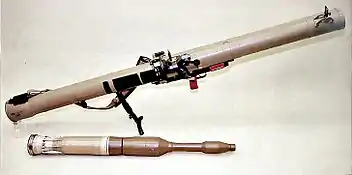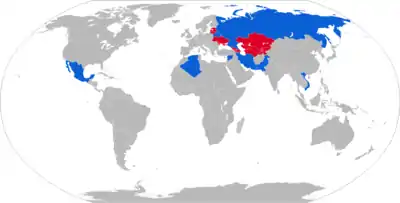RPG-29
The RPG-29 "Vampir" is a Soviet reusable rocket-propelled grenade (RPG) launcher. Adopted by the Soviet Army in 1989,[5] it was the last RPG to be adopted by the Soviet military before the fall of the Soviet Union in 1991.
| RPG-29 | |
|---|---|
 RPG-29 launcher with PG-29V rocket (mirrored image) | |
| Type | Rocket-propelled grenade |
| Place of origin | Soviet Union |
| Service history | |
| In service | 1989–present |
| Used by | See Operators |
| Wars | Iraq War[1] 2006 Lebanon War Syrian Civil War[2] |
| Production history | |
| Designer | Bazalt |
| Designed | late 1980s |
| Manufacturer | Bazalt[3] |
| Produced | 1989 |
| Specifications | |
| Mass | 12.1 kg (27 lb) unloaded (with optical sight) 18.8 kg (41 lb) loaded (ready to fire) |
| Length | 1 m (3 ft 3 in) (disassembled for transportation) 1.85 m (6 ft 1 in) (ready to fire) |
| Cartridge | PG-29V tandem rocket TBG-29V thermobaric rounds |
| Caliber | 105 mm (4.1 in) barrel 65 and 105 mm (2.6 and 4.1 in) warheads |
| Muzzle velocity | 280 m/s (920 ft/s) |
| Effective firing range | 500 m (1,600 ft) 800 m (2,600 ft) (with tripod and fire control unit)[4] |
| Sights | Iron, optical, and night sights available with ranges up to 450 m (1,480 ft); automated day and day-night sights with laser rangefinder[4] |
| Blast yield | 750 mm (30 in) RHA 650 mm (26 in) RHA after ERA 1,500 mm (59 in) Reinforced concrete 3,700 mm (150 in) Log and earth fortification |
The RPG-29 has since been supplemented by other rocket-propelled systems, such as the RPG-30 and RPG-32. The RPG-29 has been implicated in an attack on the British Challenger 2 tanks in Iraq, as well as in attacks on Israeli Merkava tanks in Lebanon, which breached the tanks' armor and in some cases injured or killed members of the crew.[6][7]
Description
The RPG-29 is a shoulder-launched, unguided, tube-style, breech-loading anti-tank rocket system with a range of 500 meters. The light weapon is designed to be carried and used by a single soldier. On the top of the launch tube is a 2.7× 1P38 optical sight.
When launched, the missile deploys eight fins as the rocket leaves the launcher, stabilizing the rocket during flight, up to a range of 500 meters.[8]
Two warheads are available for the weapon:
- The TBG-29V thermobaric anti-personnel round.
- The PG-29V anti-tank/anti-bunker round has a tandem-charge HEAT warhead for defeating explosive reactive armor (ERA). This warhead is standardized with that of the PG-7VR round fired by the RPG-7V rocket launcher.[9] With a Tandem-charge, an initial small charge triggers any reactive armor. If ERA or cage armor is absent, this charge strikes the main armor. Behind the primary charge, a much larger secondary shaped charge bursts at the rear of the initial warhead and projects a thin, high-speed-jet of metal into the armour compromised by the first charge. PG-29V is capable of killing hard targets, including tanks with ERA.
The RPG-29 is unusual among Russian anti-tank rocket launchers in that it lacks an initial propellant charge to place the projectile at a safe distance from the operator before the rocket ignites. Instead, the rocket engine starts as soon as the trigger is pulled, and burns out before the projectile leaves the barrel.
On the bottom of the tube is a shoulder brace for proper positioning along with a pistol grip trigger mechanism. A 1PN51-2 night sight can be fitted.[10]
History
The RPG-29 was developed during the late 1980s, following the development of the RPG-26, and entered service with the Soviet Army in 1989. It has recently seen intermittent use by irregular forces in the Middle East theater, including in combat against Allied forces during the Iraq War, and the 2006 Lebanon War, when it was used against Israeli forces.
2003 Iraq War
The RPG-29 is believed to have been used in skirmishes against American and British forces during the initial 2003 invasion of Iraq.[11] An RPG-29 round was reported in August 2006 to have penetrated the frontal underside hull (equipped with ERA) of a Challenger 2 tank during an engagement in al-Amarah, Iraq, maiming one and wounding several other crew members, but only lightly damaging the tank, which drove home under its own power.[12]
On August 25, 2007 a PG-29V hit a passing M1 Abrams in the hull rear wounding 3 crew members.[13] On September 5, 2007, a PG-29V hit the side turret of an M1 Abrams in Baghdad, killing 2 of the crew and wounding 1, and the tank was seriously damaged.[14]
In May 2008, The New York Times disclosed that another M1 Abrams tank had also been damaged by an RPG-29 in Iraq, while fighting Shia militias at Sadr City.[11] The US Army ranks the RPG-29 threat to armor so high that they refused to allow the newly formed Iraqi army to buy it, fearing that it would fall into insurgent hands.[15]
2006 Lebanon War
During the conflict, the Israeli newspaper Haaretz stated that the RPG-29 was a major source of IDF casualties in the 2006 Lebanon War.[16] A spokesman for the Russian Foreign Ministry denied that Russia had supplied arms directly to Hezbollah.[17] Shortly before the end of the conflict the Russian Kommersant magazine acknowledged through anonymous sources the possibility of a weapons transfer between Syria and Hezbollah during the Syrian withdrawal from Lebanon.[18]
2011 Syrian Civil War
During the Syrian Civil War, the opposition forces used the RPG-29.[19]
Mexican Drug War
The cartels are known to have smuggled RPG-29s with some seized by Mexican forces.[20]
Operators

State operators
Non-state organizations
Former operators
See also
- M47 Dragon
- LRAC F1
- M79 Osa
- Rocket-propelled grenade (includes a description of tactics and history)
References
- "Michael J. Totten: The Future of Iraq, Part I". www.michaeltotten.com. Archived from the original on 14 August 2017. Retrieved 16 March 2019.
- "La 104ème brigade de la Garde républicaine syrienne, troupe d'élite et étendard du régime de Damas". France-Soir (in French). 20 March 2017. Archived from the original on 19 October 2017. Retrieved 4 September 2018.
- https://www.forecastinternational.com/samples/weasys_msa_mpataaw_toc.pdf
- Russian Close Combat Weapon. Moscow: Association "Defense Enterprises Assistance League". 2010. pp. 444–447. ISBN 978-5-904540-04-3.
- "Modern Firearms - RPG-29". World.guns.ru. Archived from the original on 2010-09-15. Retrieved 2012-01-29.
- Rayment, Sean (2007-05-13). "MoD kept failure of best tank quiet". The Telegraph. Archived from the original on 2015-07-04. Retrieved 2015-05-12.
- Litovkin, Viktor (11 Aug 2006). "RPG-29 To Blame In Lebanon". spacewar.com. Archived from the original on 24 September 2015. Retrieved 12 May 2015.
- OPFOR Worldwide Equipment Guide, TRADOC DCSINT Threat Support Directorate, US Army, via Scribd, 2001, archived from the original on 2014-02-01, retrieved 2017-09-10
- "RPG-29 anti-tank rocket launcher". Firearms Russia. Archived from the original on 2016-03-02. Retrieved 2015-10-08.
- ИЗДЕЛИЕ 1ПН51-2 ТЕХНИЧЕСКОЕ ОПИСАНИЕ И ИНСТРУКЦИЯ ПО ЭКСПЛУАТАЦИИ [PRODUCT 1PN51-2 TECHNICAL DESCRIPTION AND OPERATING INSTRUCTIONS] (in Russian). September 1991. 52 pages.
- Michael R. Gordon (May 21, 2008). "Operation in Sadr City Is an Iraqi Success, So Far". The New York Times. Archived from the original on June 23, 2017. Retrieved February 20, 2017.
- Sean Rayment (May 12, 2007). "MoD kept failure of best tank quiet". Sunday Telegraph. Archived from the original on April 18, 2008. Retrieved May 23, 2019.
- "Iraq War Diary". wikileaks.org. Archived from the original on 2015-06-02. Retrieved 2014-11-26.
- "Iraq War Diary". wikileaks.org. Archived from the original on 2015-06-02. Retrieved 2014-11-26.
- Craig S. Smith (August 28, 2005). "Big Guns For Iraq? Not So Fast". New York Times. Archived from the original on October 13, 2013. Retrieved February 20, 2017.
- Schiff, Ze'ev (6 August 2006), Hezbollah anti-tank fire causing most IDF casualties in Lebanon, Haaretz, archived from the original on April 16, 2018
- Russia denies sending anti-tank weapons to Hizbollah - ministry, RIA Novosti, 10 August 2006, archived from the original on 20 August 2006, retrieved 21 August 2006
- Russian Minister says Russia, Israel have settled differences over Hezbollah arms, International Herald Tribune, 20 October 2006, archived from the original on 2006-11-26
- "The US is looking at a major tank upgrade, but a weapon to counter it is already out there". Business Insider Deutschland (in German). Archived from the original on 2018-05-07. Retrieved 2018-05-06.
- https://smallwarsjournal.com/jrnl/art/mexican-cartel-tactical-note-20-rpg-29-anti-armor-munitions
- "آرپی جی29؛تیری جدید در کمان ارتش ایران + عکس". مشرق نیوز (in Persian). 7 January 2012. Archived from the original on 1 May 2017. Retrieved 2 June 2017.
- Montes, Julio A. (8 May 2015). "Portable Anti-Tank Weapons in Mexico & the Northern Central American Triangle". Small Arms Defense Journal. Vol. 7 no. 1. Archived from the original on 2 April 2019.
- Galeotti (2015), p. 56.
- Small Arms Survey (2015). "Trade Update: After the 'Arab Spring'" (PDF). Small Arms Survey 2015: weapons and the world (PDF). Cambridge University Press. p. 107. Archived (PDF) from the original on 2018-01-28. Retrieved 2018-08-29.
- https://21stcenturyasianarmsrace.com/2018/09/05/vietnam-builds-so-many-weapons-for-its-army/
- "North Korea sanctions evasion efforts detailed in UN's latest PoE report - NK News - North Korea News". nknews.org. 12 March 2019. Archived from the original on 15 March 2019. Retrieved 16 March 2019.
- https://jamestown.org/program/hezbollahs-creative-tactical-use-of-anti-tank-weaponry/
- https://www.ctc.usma.edu/the-combat-performance-of-hamas-in-the-gaza-war-of-2014/
- Small Arms Survey (2012). "Surveying the Battlefield: Illicit Arms In Afghanistan, Iraq, and Somalia" (PDF). Small Arms Survey 2012: Moving Targets. Cambridge University Press. p. 326. ISBN 978-0-521-19714-4. Archived from the original on 2018-08-31. Retrieved 2018-08-30.
Bibliography
- Galeotti, Mark (2017). The Modern Russian Army 1992–2016. Oxford: Osprey Publishing. ISBN 978-1472819086.
External links
- https://archive.today/20130620012148/http://www.gunsandweapons.net/rpg-29/ RPG-29 - Vampyr all about
- Fofanov, Vasiliy. "Modern Russian Armor". Retrieved 5 October 2015.
| Wikimedia Commons has media related to RPG-29. |